MercoPress. South Atlantic News Agency
Tag: Pedro Sanchez PSOE
-
Thursday, May 9th 2019 - 06:52 UTC
What could dilute the EU, populism or the lack of a unifying external threat?

By Gwynne Dyer - For the second time in a month, a member country of the European Union has NOT voted a populist into power. Could it be that the populist wave has broken?
-
Tuesday, April 23rd 2019 - 09:06 UTC
Catalonia’s secession surfaces again in Spanish debate ahead of Sunday elections
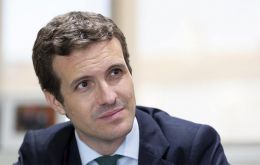
Spain's outgoing prime minister faced an onslaught of criticism on Monday from his right-wing rivals over Catalonia's secession crisis in a testy four-way debate ahead of elections, while he warned them against cosying up to the far-right.
-
Saturday, December 22nd 2018 - 06:11 UTC
Catalonia protest President Sanchez decision to lead his weekly cabinet meeting in Barcelona
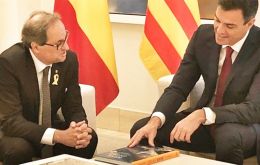
Thousands of pro-independence protesters angry about Spain’s cabinet holding a meeting in Catalonia have blocked roads across the region and clashed with anti-riot police in its capital. Grassroots separatist groups and unions called the protests to show their disgust at Spanish Prime Minister Pedro Sanchez’s decision to lead his weekly cabinet meeting in Barcelona.
-
Thursday, December 13th 2018 - 07:07 UTC
Spain's minimum wage will increase by 22% in 2019, announces PM Sanchez
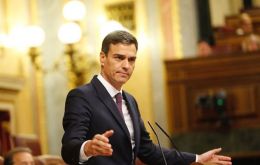
Spain's minimum wage will jump by 22% in 2019 - the largest annual increase in more than 40 years. It means millions of low-paid workers could see a pay rise from €736 ($835; £665) to €900, effective from January. Prime Minister Pedro Sanchez announced the increase on Wednesday, declaring “a rich country cannot have poor workers”.
-
Monday, December 3rd 2018 - 07:34 UTC
Far right party wins seats in Andalusia: first time since the death of Franco in 1975
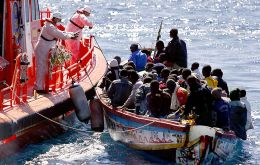
A far-right party has won seats in a Spanish regional election for the first time since the country's military dictatorship ended in 1975. The Vox party took 12 parliamentary seats in Andalusia on Sunday, beating expectations that it would win five.
-
Friday, June 1st 2018 - 06:48 UTC
“Mr. Rajoy your time is up”, Socialist Sanchez calls for the resignation of the conservative leader

Spain’s Partido Popular government appeared doomed last night to lose a no-confidence vote in parliament, with the centre-left PSOE poised to take power. A Basque nationalist party’s decisive announcement that it would vote in favor of the motion spelled the almost certain end of Prime Minister Mariano Rajoy’s mandate and foretold the stunning collapse of his minority government in a parliamentary vote today Friday, when it will be short of support to survive.
-
Wednesday, October 4th 2017 - 07:02 UTC
Catalonia expected to declare independence in matter of days; King says situation is extremely serious and calls for unity
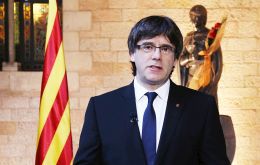
Catalonia will declare independence from Spain in a matter of days, the leader of the autonomous region has told the BBC. In his first interview since Sunday's referendum, Carles Puigdemont said his government would “act at the end of this week or the beginning of next”.
-
Thursday, October 27th 2016 - 08:57 UTC
Rajoy could become prime minister on Sunday but with a Spanish political system in disarray
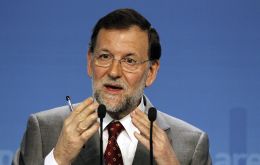
Spain’s acting Prime Minister Mariano Rajoy accepted a mandate from King Felipe to seek parliament’s backing to form a new government and end over ten months of political deadlock, which is expected to happen on Sunday. The Socialist party agreed a last Sunday to abstain in the vote, allowing Rajoy to lead a minority government of his conservative Partido Popular.
-
Tuesday, August 30th 2016 - 07:25 UTC
Spain heading for a new political deadlock and a possible new election in Christmas
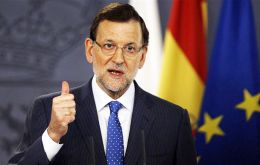
Spain's acting prime minister said on Monday that he would continue to seek support to form a minority government and end an eight-month political impasse even if he fails to win confidence votes in parliament this week as is expected.
-
Thursday, July 28th 2016 - 13:56 UTC
Spanish King “concerned” with political paralysis; no stable government in sight
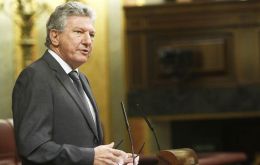
King Felipe VI is “concerned” with Spain's political paralysis, a lawmaker who met him said as the monarch began a fourth round of talks with party representatives to try and agree on a government. Spain has been without a fully-functioning government for seven months after December elections failed to give any party an absolute parliamentary majority.
